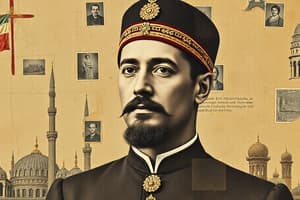Podcast
Questions and Answers
Who was sent by the Ottomans to quiet the unrest in Egypt?
Who was sent by the Ottomans to quiet the unrest in Egypt?
- Napoleon
- Mamluks
- Albian
- Mohammad Ali (correct)
How did Mohammad Ali eliminate the Mamluk challengers?
How did Mohammad Ali eliminate the Mamluk challengers?
- He negotiated a peace deal with them
- He held a dinner party and then shot all of them (correct)
- He expelled them from Egypt
- He appointed them as his advisors
What term is used to describe the process of reforms in the Ottoman Empire?
What term is used to describe the process of reforms in the Ottoman Empire?
- Mamluk Era
- Tanzimat (correct)
- Napoleonic Reforms
- Ottoman Restoration
What did Muslims eventually realize about their knowledge and beliefs?
What did Muslims eventually realize about their knowledge and beliefs?
What region was Mohammad Ali originally sent to by the Ottomans?
What region was Mohammad Ali originally sent to by the Ottomans?
What type of codes were imported and applied in the Ottoman Empire as part of the reforms?
What type of codes were imported and applied in the Ottoman Empire as part of the reforms?
Which group had the same rights as Muslims under western pressure, undermining the ideological premise of the Ottoman Empire?
Which group had the same rights as Muslims under western pressure, undermining the ideological premise of the Ottoman Empire?
In what year did the Ottoman Empire adopt a constitution along the lines of the Belgian constitution?
In what year did the Ottoman Empire adopt a constitution along the lines of the Belgian constitution?
Which assembly was created with a nominated Upper House and a Lower Chamber of elected representatives from all over the Ottoman empire?
Which assembly was created with a nominated Upper House and a Lower Chamber of elected representatives from all over the Ottoman empire?
Who had the final word and the authority to dissolve the assembly and suspend the Constitution in the Ottoman Empire?
Who had the final word and the authority to dissolve the assembly and suspend the Constitution in the Ottoman Empire?
Which country occupied Egypt following Egypt's bankruptcy in 1882?
Which country occupied Egypt following Egypt's bankruptcy in 1882?
Why did Britain and France want to keep the Ottoman empire alive in the late 19th century?
Why did Britain and France want to keep the Ottoman empire alive in the late 19th century?
Who tried to reconcile the cognitive dissonance of Muslims facing Western domination in the Ottoman Empire?
Who tried to reconcile the cognitive dissonance of Muslims facing Western domination in the Ottoman Empire?
In what century did it become clear that the Ottoman empire exists only because Britain and France allow it to and don't want it to fall?
In what century did it become clear that the Ottoman empire exists only because Britain and France allow it to and don't want it to fall?
What did Muslims realize about political freedom and scientific innovation in revelation-based societies in the late 19th century?
What did Muslims realize about political freedom and scientific innovation in revelation-based societies in the late 19th century?
What impact did Jamal Adid al Afghani and Mohammad Abduh have on later ideologies?
What impact did Jamal Adid al Afghani and Mohammad Abduh have on later ideologies?
Why did Britain and France want to keep the Ottoman empire alive in the late 19th century?
Why did Britain and France want to keep the Ottoman empire alive in the late 19th century?
What was the ultimate outcome of the Tanzimat, as stated in the text?
What was the ultimate outcome of the Tanzimat, as stated in the text?
Which country occupied Egypt following Egypt's bankruptcy in 1882?
Which country occupied Egypt following Egypt's bankruptcy in 1882?
What was the Sultan's specific authority in relation to the assembly and Constitution in the Ottoman Empire?
What was the Sultan's specific authority in relation to the assembly and Constitution in the Ottoman Empire?
What did Muslim scholars of the late 19th century realize about the connection between doubt-based societies and innovation?
What did Muslim scholars of the late 19th century realize about the connection between doubt-based societies and innovation?
Why did the Muslim scholars believe that revelation-based society needed to be replaced with a doubt-based society?
Why did the Muslim scholars believe that revelation-based society needed to be replaced with a doubt-based society?
What was the dilemma faced by Muslims, as described in the text?
What was the dilemma faced by Muslims, as described in the text?
What is required to establish a doubt-based society?
What is required to establish a doubt-based society?
What was presented as the rational proof for the existence of God, Mohammad as the prophet, and the Quran as the final revelation?
What was presented as the rational proof for the existence of God, Mohammad as the prophet, and the Quran as the final revelation?
How did Mohammad Ali describe the state of Islam in Europe and Egypt?
How did Mohammad Ali describe the state of Islam in Europe and Egypt?
What did Mohammad Ali suggest about the role of Islam in a truly Muslim society?
What did Mohammad Ali suggest about the role of Islam in a truly Muslim society?
What does Christian Fundamentalism believe about the Christian text and science?
What does Christian Fundamentalism believe about the Christian text and science?
In a doubt-based society, what determines the recognition of truth according to the project initiated in the late 19th century?
In a doubt-based society, what determines the recognition of truth according to the project initiated in the late 19th century?
What did Muslim scholars argue about belief in God, Muhammad as the prophet, and the Quran as the final revelation?
What did Muslim scholars argue about belief in God, Muhammad as the prophet, and the Quran as the final revelation?
Flashcards are hidden until you start studying




